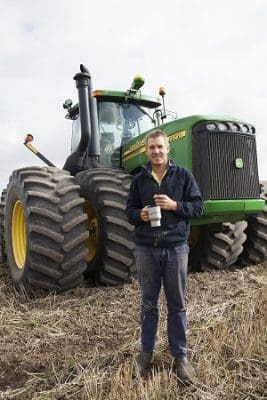A SIGNIFICANT amount of farming assets will be passed on to the next generation as the baby boomer population looks to retire in the next decade, representing a great opportunity for farming families to expand and diversify their businesses.
That’s the view of 2016 Nuffield Scholar, James Dempster, who was supported by the Grains Research & Development Corporation (GRDC) to research the successful expansion of family farms around the world and to determine whether those expansion plans could be leveraged by off-farm investors.
Together with his family, Mr Dempster operates a mixed cropping and sheep enterprise at Mingenew, in the northern wheatbelt in Western Australia.
The business has undergone significant change over the past 10 years, shifting its focus from livestock to cropping, to deliver increased profitability.
The Nuffield study topic was prompted by the family’s own succession story with parents Liz and Phil retiring and moving off-farm, which meant adding a superannuation fund and transferring management to Mr Dempster and his brother Tim, who both started families of their own in recent years.
Having visited farms in South America, North America, Europe and New Zealand, Mr Dempster’s report takes a close look into some of the world’s best and most innovative examples of farm ownership, leasing and funding models.
He hopes these learnings can be applied by other broadacre farmers back home in Western Australia who, like him, are faced with a similar challenge to ‘go bigger’ so as to achieve better farm profitability.
“Farmers are becoming increasingly focussed on the costs of production. This is compounded by climatic and price volatility in addition to the general cost of inputs and machinery,” he said.
“Research shows that expansion can play a key role in easing these pressures and boosting efficiencies on-farm – but it’s not always an easy road, particularly for young farmers.
“The core of my research was to better understand how farmers around the world are acquiring land and embracing new funding models to reach their expansion goals, and to introduce those ideas here.”
The report quotes GRDC research (Sevenson, K. 2017) that 90 per cent of farm businesses in Western Australia are owned by local families and have achieved their scale through a combination of bank lending, leasing and share farming.
“Our own business is a combination of owned land, which provides security and equity, and leased land, which helps to achieve scale and drive greater efficiencies without taking on enormous amounts of debt,” Mr Dempster said.
“We’ve found this to be successful for our business structure, but being strategic and disciplined is absolutely critical, as is seeking advice to ensure it’s the right path for a farm business to go down.”
Mr Dempster said there were several options available to farmers, and adopting a more corporate structure might make it a smoother and more successful process to access finance like equity partnerships and joint ventures.
 “Attracting outside capital sources means a farm has to become ‘investor-ready’,” he said.
“Attracting outside capital sources means a farm has to become ‘investor-ready’,” he said.
“There are a number of steps farm businesses can take to attract and retain investment, and those doing it well have business plans, public liability insurance, good corporate governance, thorough records and historic industry benchmarking in place.
“In today’s age it’s also about having comprehensive human resource policies that foster a positive work culture, encompass health and safety procedures and demonstrate plans towards environmental sustainability.
“Many farm businesses are taking advantage of branding and online marketing, which is proving to be highly beneficial for small farming projects or niche products, particularly on private equity platforms such as crowdfunding.”
Mr Dempster visited a range of farms, corporations and equity groups from around the world, proving that there is no ‘one size fits all approach’, but says planning and risk management are absolutely critical.
“It’s about covering all your bases, from inception right through to an exit strategy,” he said.
“For instance, creating multiple income streams can be very useful when it comes to succession planning, particularly as a way of avoiding the sale or splitting of farm land.
“Teaming up with other farmers to pool resources to achieve common goals is another way to improve productivity and to build the ‘empire’.
“This has been highly successful on farms I visited in New Zealand where multiple farming families have come together to achieve economies of scale and, more recently, purchase additional land.”
For farmers looking for investors, Mr Dempster recommends connecting with farm management companies.
“There’s a lot of interest from institutional investors, but creating an equity partnership can be difficult, particularly if you don’t know where or how to find a financial partner.
“It’s provided a gap in the market for farm management companies, which find, acquire and manage farm land in a transparent manner that ensures the goals of all parties are met.
“While most offer a range of services to their clients, generally they partner with land owners to build investment-grade farmland portfolios.
“And it’s not just here in Australia. I met with the owner of a Canadian farm management company, who said there was great opportunity for his company to partner with existing farmers looking to expand or scale back, exit the industry, set up off-farm or create partnerships in other countries like Australia.
“Essentially, these companies are looking for a range of things, but good farm managers rank fairly high, and, as the baby boomers look to retire in coming years, I see great potential for more partnerships like these in Australia.”
Source: Nuffield Australia, GRDC


HAVE YOUR SAY